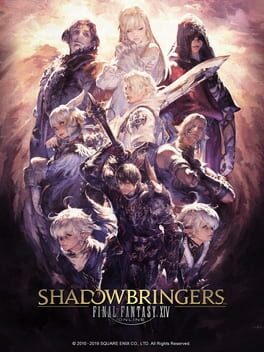This review contains spoilers
//Spoilers for Shadowbringers and Endwalker//
Shadowbringers is, more so than Endwalker was, an example of a game that attempts to present a philosophically compelling argument within the trite structure of an MMORPG. Don't get me wrong, I do love Endwalker and I do find it very philosophically compelling, no doubt, but something about the way Shadowbringers presents its quandary is infinitely more resonant, in my opinion at least.
One thing about A Realm Reborn that has unfortunately stuck with FFXIV throughout the whole runtime is the trite quest structure, which is a given considering that an MMORPG of this kind is built around those very ideas. That being said, one reason why Shadowbringers is just more bearable than FFXIV's swaths of fetchquesting is the pacing and the narrative, both of which more than make up for the game's mechanical shortcomings.
Easily the most compelling part of Shadowbringers is its attempt to use the narrative, pacing, and overall story structure to tell a rich philosophical narrative whose subtext is just as rich as the text, especially taking Endwalker's Elpis arc into account. In fact, without Elpis and the wonders it does for the likes of Hydaelyn and Hades, I don't think I'd love Shadowbringers as much as I do.
Like Xenogears did decades prior, what makes Shadowbringers' main conflict so compelling and engaging is not the physical confrontation between the Warrior of Darkness and Emet-Selch, but the ideological one, evident as it is as a result of Emet's subdued role for the majority of the story. In addition to the physical challenge, he is also giving you the chance to change his mind, akin to a Greek dialogue. Every single facet of Norvrandt, from Eulmore to Amaurot reflects each side of the argument, each serving as fundamental refutations to one another. The parallels to Plato's writing shouldn't be lost on us when Amaurot is a literal embodiment of a virtuous city, and the shards are literally called "reflections" in the same way the shadows are a reflection of his virtuous heaven (the real Amaurot in this case).
I'd be remiss to not mention the "thou must live, die, and know" scene from Endwalker, which, alongside the entire Elpis stretch, gives much needed context to both sides of the argument. Hell, the scene itself quite literally makes parallels to the final confrontation in Shadowbringers if that's any indication (as well as Venat's monologue paralleling the final dialogue of Xenogears, but that's a conversation for another time).
All in all, a beautiful expansion that is not only a great story in its own right, but one that's presented in such a philosophically compelling way that makes me appreciate much more upon further reflection. I didn't talk about 5.0's ending all that much, or even 5.3 and how that patch enhances the story further, because if I did I'd be here all day, though as it stands I do think Shadowbringers is my favorite XIV expansion, even if its by the tiniest of margins.
Shadowbringers is, more so than Endwalker was, an example of a game that attempts to present a philosophically compelling argument within the trite structure of an MMORPG. Don't get me wrong, I do love Endwalker and I do find it very philosophically compelling, no doubt, but something about the way Shadowbringers presents its quandary is infinitely more resonant, in my opinion at least.
One thing about A Realm Reborn that has unfortunately stuck with FFXIV throughout the whole runtime is the trite quest structure, which is a given considering that an MMORPG of this kind is built around those very ideas. That being said, one reason why Shadowbringers is just more bearable than FFXIV's swaths of fetchquesting is the pacing and the narrative, both of which more than make up for the game's mechanical shortcomings.
Easily the most compelling part of Shadowbringers is its attempt to use the narrative, pacing, and overall story structure to tell a rich philosophical narrative whose subtext is just as rich as the text, especially taking Endwalker's Elpis arc into account. In fact, without Elpis and the wonders it does for the likes of Hydaelyn and Hades, I don't think I'd love Shadowbringers as much as I do.
Like Xenogears did decades prior, what makes Shadowbringers' main conflict so compelling and engaging is not the physical confrontation between the Warrior of Darkness and Emet-Selch, but the ideological one, evident as it is as a result of Emet's subdued role for the majority of the story. In addition to the physical challenge, he is also giving you the chance to change his mind, akin to a Greek dialogue. Every single facet of Norvrandt, from Eulmore to Amaurot reflects each side of the argument, each serving as fundamental refutations to one another. The parallels to Plato's writing shouldn't be lost on us when Amaurot is a literal embodiment of a virtuous city, and the shards are literally called "reflections" in the same way the shadows are a reflection of his virtuous heaven (the real Amaurot in this case).
I'd be remiss to not mention the "thou must live, die, and know" scene from Endwalker, which, alongside the entire Elpis stretch, gives much needed context to both sides of the argument. Hell, the scene itself quite literally makes parallels to the final confrontation in Shadowbringers if that's any indication (as well as Venat's monologue paralleling the final dialogue of Xenogears, but that's a conversation for another time).
All in all, a beautiful expansion that is not only a great story in its own right, but one that's presented in such a philosophically compelling way that makes me appreciate much more upon further reflection. I didn't talk about 5.0's ending all that much, or even 5.3 and how that patch enhances the story further, because if I did I'd be here all day, though as it stands I do think Shadowbringers is my favorite XIV expansion, even if its by the tiniest of margins.
